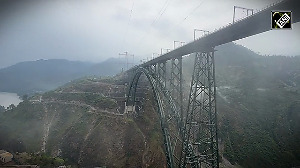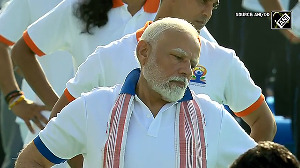The International Atomic Energy Agency on Thursday said that India has a leading role in promoting safe and secure use of nuclear technology in Asia.
Since Asia is going to be a major player in nuclear power and technology, New Delhi's role will be significant in promoting atomic safety and security in the region, IAEA's Deputy Director General T Taniguchi said in Mumbai.
He was speaking at a function at Bhabha Atomic Research Centre.
The nuclear watchdog's official said India, with long-standing experience in operating nuclear plants and building human and knowledge resources, can be a guiding force for new entrants seeking to harness atomic technology for producing power.
"Safefy and security issues may not be easily understood by the new players. With its good safety and security records, India could lead them in the region," observed Taniguchi, who is part of a 15-member high-level delegation of the International Nuclear Safety Group.
Planning spread over 10 to 15 years is required for building a strong nuclear safety infrastructure, he said.
Speaking at a colloquium on 'Global partnership for nuclear safety and security,' Taniguchi said the definition of world peace was changing with the protection of people and environment becoming the most important factors.
"We are moving towards a holistic approach with 10-point nuclear safety principles, including the responsibility of operators and users, role of government and emphasis on leadership and management in safety culture," he noted.
The IAEA is also working on harmonisation and benchmarking standards and by 2011, several countries like China, Japan and Pakistan will adhere to these safety norms.
Speaking on 'nuclear renaissance,' INSAG chairman Richard Meserve said there were several reasons for renewed interest in nuclear power in the US.
Meserve, a former chairman of the US Nuclear Regulatory Commission, said some of these reasons include political and global threat and the need to respond to climate change.






